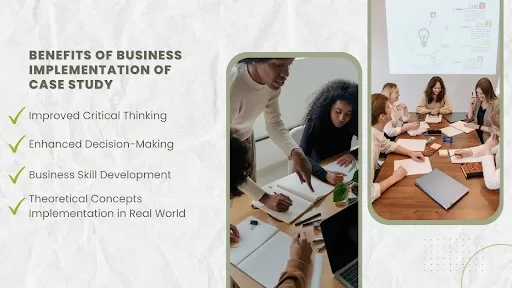Business is fast-paced and ever-changing, so obstacles are inevitable. Businesses have challenges, whether they’re a startup attempting to find its footing, a large company managing market fluctuations, or a non-profit trying to make a difference. These real-world business difficulties often test an organization’s resilience and adaptation.
Such obstacles might be scary, but they also provide growth and innovation. Here come case studies. They are powerful tools for understanding and solving business problems. They help organizations examine, learn from, and solve challenges. By exploring these real-life events, individuals and teams can acquire insights, improve critical thinking, and make educated decisions.
Studying case study in business provides practical insights and real-world examples for decision-making. Available online option “Write my case study for me” from services that can do a case study helps individuals develop problem-solving and critical thinking skills, bridging the gap between theory and practice. They also aid in understanding industry-specific challenges, preparing for future scenarios, and learning from both successes and failures. Overall, they are a valuable tool for improving business strategies and staying competitive in a dynamic marketplace.
Case Studies and Business Vital Intersection Role
The relationship between professional challenge and education is important. It’s not just organizations that benefit from case studies; Students and prospective entrepreneurs find great value in learning and dissecting these real-world scenarios. The intersection of entrepreneurial challenge and education negotiates theoretical skills with practical applications, and equips individuals with the skills necessary to succeed in the professional world.
As the name suggests, case studies are in-depth looks at real-life issues, issues, or problems that businesses face. They give a full account of what happened, the choices that were made, and how those choices turned out. These stories contain a lot of useful details that help readers fully comprehend the difficulties encountered and the methods used to deal with them.
Case study help businesses solve problems in the real world by:
- Sharing useful ideas and answers based on real-life situations.
- Making it possible to learn from both great and unsuccessful business strategies.
- Getting better at handling problems and thinking critically.
- Bringing together what you know in theory and what you can do with it in real life.
- Getting a better grasp on problems and changes that are unique to the industry.
- Analyzing similar real-life situations can help people make decisions.
- Getting people and businesses ready to react to changing market conditions.
- Find the best ways to do things and set standards for improving success.
- Learning from past mistakes and errors to lower risks.
- Case talks and presentations help people improve their ability to communicate and work together.
Understanding Real-World Business Challenges
The realities of the corporate world are just one of many problems organizations have to deal with. Market changes, competition, financial constraints, technology, human resources, ethical concerns and even crises are all part of these challenges. For instance, a company that finds it difficult to turn around declining sales may face a crisis adapting to changing consumer preferences.
The Need for Effective Ways to Solve Business Problems
Teams need improved techniques to solve these issues. This is where the case study excels. Detailed case study writing can reveal which techniques worked and which didn’t. They can experiment, see what works, and apply what they learn to make better judgments.
The fact that real-world business challenges are in a state of perpetual flux is one of the most significant aspects pertaining to these issues. Because of the rapid pace of change in the business world, it is essential for firms to be able to adjust quickly in order to preserve their viability and achieve their goals. Case studies are effective at capturing the dynamic aspect of a problem because they place the issue in its current context. Studying at universities, students are given the opportunity to get professional assignment help and get an understanding of how decisions taken at one point in time can have an impact on the way a business develops in the years to come.
Advantages of Case Study Implementation in Business Education and Development
 Improved Critical Thinking and Problem-Solving Skills
Improved Critical Thinking and Problem-Solving Skills
Case studies are extremely beneficial in fostering analytical and deductive reasoning, as well as problem-solving abilities. The text challenges its audience to engage in analytical thought, locate material that is pertinent to the narrative, and draw connections between the many components of the narrative. Students will be guided through the process of developing an organized and strategic approach to addressing complex situations by participation in this program.
Enhanced Decision-Making and Judgment
People can improve their ability to make decisions by throwing themselves wholeheartedly into the problems presented by the real world. They are skilled at examining a number of different possibilities, anticipating potential outcomes, and making choices based on that information. In both educational and professional contexts, the capacity to make decisions after giving them careful consideration is an extremely valuable skill.
Real-World Context for Theoretical Concepts
Many individuals educate themselves theoretically by reading books and attending lectures. When applied to circumstances that occur in the actual world, this information becomes much more helpful. Students have the chance to see how theories and frameworks are applied to real-world business situations through the use of case studies, which provide valuable bridges between theory and practice and are a valuable teaching tool in their own right.
Skill Development for Future Business Leaders
Case studies offer students and aspiring business professionals significant possibilities to build abilities that are necessary for future leadership roles. These opportunities can be found in the form of such scenarios. They offer excellent chances to improve abilities in leadership, problem solving, communication, and teamwork, all of which are essential in a professional setting. They are an essential component in the process of educating the next generation of executives and business leaders.
The Methodology Behind Developing and Employing Case Studies
- Choosing Appropriate Business Challenges
The process of designing and putting into practice case studies begins with the selection of relevant problems faced by businesses. It is essential for organizations or instructors to locate environments that are congruent with the learning goals or areas of focus that they have identified. The obstacles that are presented should be representative of the wide variety of problems that students or professionals may face throughout their professional path.
- Research and Data Gathering
After selecting a business challenge, conduct extensive study and acquire necessary data. Information about the firm addressing the challenge, the industry background, and key stakeholder decisions is crucial. Data depth and correctness substantially affect data analysis quality.
- Developing a Structured Case Study
The best case studies are those whose structure stimulates active learning and keeps readers interested. Having the problem, choices, metrics, and outcomes spelled out would be helpful. It is important for case studies to spark conversation by offering challenges or questions for consideration.
- Classroom or Organizational Implementation
Many educational and organizational settings use case studies. Teachers can use them to spark lively discussion, thoughtful analysis, and healthy debate. Students also can get case study help online on the web. Case studies are adaptable organizationally. They are useful for strategy planning, personnel training, and decision-making.
- Aligning Case Studies with Educational Objectives
It’s crucial to ensure that these scenarios are aligned with specific learning objectives to maximize their educational value. This ensures that the case study serves as a practical and effective tool for accomplishing the established goals.
To summarize
Case studies play an essential part in the education of business students as well as the process of making business decisions since they provide useful insights, encourage critical thinking, and assist both individuals and companies in adapting to a dynamic and ever-changing corporate environment. They are an effective method for gaining knowledge from one’s own experiences in the real world and putting that information to use to better one’s company strategy and results.

